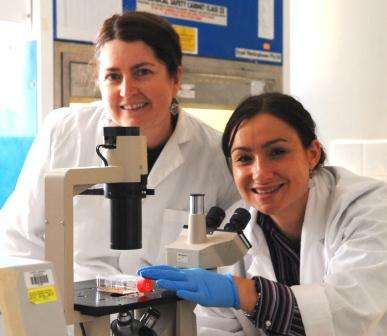Research uncovers a potential role of two proteins in diabetes

(Medical Xpress)—Flinders University researchers are breaking new ground in a decade-long journey to pinpoint the function of two closely related proteins.
They now have data that reveals a role for these proteins in regulating cell metabolism. Disturbances in metabolism underlie a number of human diseases including type 2 diabetes, obesity and cancer.
The team, led by Associate Professor Catherine Abbott from the School of Biological Sciences, has discovered that two proteins called dipeptidyl peptidases (DP) 8 and 9 play a role in regulating at least 29 other proteins, many of which play important roles in metabolism and energy production.
As a way to control blood glucose levels, people with type 2 diabetes that do not respond to the drug metformin are given januvia or sitagliptin, a drug to supress dipeptidyl peptidase-4 (DP4), which belongs to the same family of proteins as DP 8 and 9.
However, Associate Professor Abbott said that when tested at high doses these drugs also inhibited DP 8 and 9.
She said more research was now needed to determine the exact role of DP 8 and 9 because "we don't know whether they have a positive effect on metabolism and energy and managing glucose levels or a negative effect".
"Pharmaceutical companies claim their drugs are selective and don't bind to other proteins but in high doses there's a possibility they could," said Associate Professor Abbott.
"What we need to find out, and what this study suggests, is that if these drugs do block DP 8 and 9 it might not necessarily be a bad thing because DP 8 and 9 could also be targets in the treatment of diabetes," she said.
"On the other hand, blocking them might affect metabolism and energy in an adverse way, which could make the DP4 inhibitors unsafe."
The research has just been published in the international Journal of Biological Chemistry as "Paper of the Week".
Only 50 to 100 papers are chosen as Paper of the Week from more than 6000 manuscripts published in the journal each year, based on their significance and overall importance to the understanding of biological processes at a molecular and cellular level.
Associate Professor Abbott, who discovered DP 8 and 9 more than 10 years ago, said the proteins and DP4 may also play a role in tumour growth, therefore a better understanding of their function could also led to increased confidence in the safety of DP4 inhibitors or in a new use for inhibitors as a cancer therapy.
More information: www.jbc.org/cgi/doi/10.1074/jbc.M112.445841
















